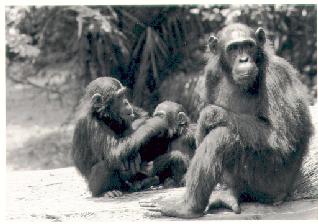Re: Are there any extinct chimpanzee species? Or just two known?
Area: Evolution
Posted By: Tim Susman, Staff Zoology, University of Minnesota, St. Paul, MN
Date: Wed Oct 15 09:47:47 1997
Area of science: Evolution
ID: 875214676.Ev
Message:
You've asked a tough question, Steve. We know that humans and chimps had a
common ancestor about six million years ago (6-8 mya is the range I usually
hear), and humans and bonobos may have had a common ancestor more recently
than that. The recent fossil record of apes in Africa is notoriously
sparse, and even more so for the chimpanzees and gorillas than for humans.
There has almost certainly been some evolution in 6-8 million years
of chimpanzee life, as modern chimpanzee skeletons differ from the
skeletons that we have found that are close to that common ancestor.
The current species Pan troglodytes (common chimpanzee) has
three recognized subspecies: Pan troglodytes troglodytes, Pan
troglodytes schweinfurthii, and Pan troglodytes verii. These
subspecies have some physical differences, and based on DNA analysis, some
people have suggested that Pan troglodytes verii should be
recognized as a separate species. I believe there is only one subspecies
of Pan paniscus (bonobo). Apart from these living species, no
species of chimpanzee has gone extinct in recent times -- but it is
possible that there were other species that became extinct before we
started keeping track of them.
If you want to read more about chimpanzees, take a look at Discovering Chimps, the web site
maintained by the Jane Goodall Institute's Center for Primate Studies.
They have little evolution information, but a lot of information about
chimpanzees, especially the famous chimpanzees of Gombe studied by Jane
Goodall, and they have links to other chimpanzee sites. Below is a picture
of a chimpanzee family from Gombe.

Current Queue |
Current Queue for Evolution |
Evolution archives
Try the links in the MadSci Library for more information on Evolution.
MadSci Home | Information |
Search |
Random Knowledge Generator |
MadSci Archives |
Mad Library | MAD Labs |
MAD FAQs |
Ask a ? |
Join Us! |
Help Support MadSci
MadSci Network
© 1997, Washington University Medical School
webadmin@www.madsci.org
